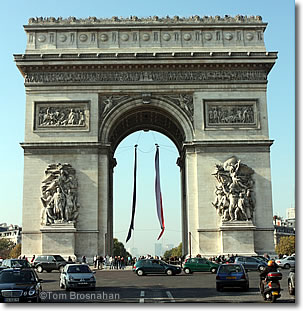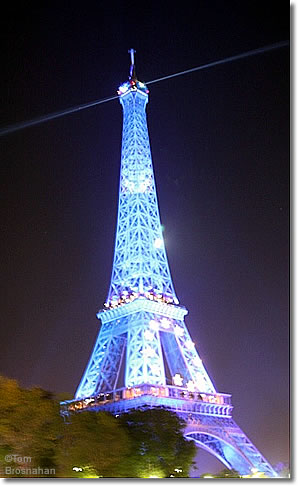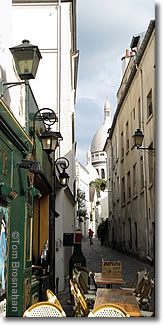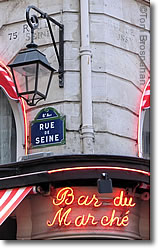Terrorist incidents have taken place in some of the world's greatest cities: London, Paris, Madrid, New York, Boston, Ankara, Istanbuland more.
For travelers the question is: is it safe to visit Paris and France now?
Considerations
Since terrorism incidents worldwide peaked in 2014, there has been a steady decrease in incidents, particularly in Europe.
We travel in France twice each year. We have noticed increased security at museums, transportation termini, and public events, but that is reassuring.
Even if there were to be a terrorist incident in Paris while we are there, the chances of our being anywhere near it, let alone in danger of it, would be minuscule. Paris is a city of more than 2.2 million people covering 105.4 square kilometres (40.7 square miles). The probability of our being within a hundred meters of any incident—that is, close enough to be directly affected—at precisely the time of the event, is minuscule.
Actually, we're more concerned about Parisian pickpockets than about terrorists. (Read these tips on how to avoid scams, thefts and robberies in Paris and France.)
In 2013 in Boston, near where we live, terrorists killed 3 people and injured 264. We were safe—on that day, we were in Istanbul. Even had we been in Boston, we would not have been at the site of the incident. Do we go to Boston now? All the time. Do we worry? No.
In one week in October 2015, numerous students, faculty and staff were gunned down in cold blood on three separate university campuses in the USA. Are we now afraid to visit US university campuses or high schools? No, because the real chance of harm is minuscule.
That having been said, we will never say "Nothing bad can happen" because it always can, anywhere in the world, at any time, and it cannot be predicted.
Terrorism: How Dangerous
is It...Really?
The whole point of terrorism is to make people who are basically safe to feel unsafe in order to achieve political ends. It is a tactic used by those who cannot command overwhelming force. It works because there is always a chance one may be harmed in an incident, even when that chance is vanishingly small.
If we had been in Paris at precisely the locations and moments when the November 13th terrorist incidents occurred, we could have been affected...but what are the chances of our being in precisely that location—within 100 meters, in a vast city—at precisely that second, in all the 86,400 seconds in a day?
Sensational daily news coverage keeps the tiny but real threat of terrorism in front of us, while the greater threats (disease, auto accidents, earthquakes, drowning, lightning strikes, etc.) aren't in our thoughts.
Terrorism is like a freak accident: yes, it can happen. No, the chances of its happening to you are not significant. According to the Global Terrorism Index (2014), France, with a GTI score of 2.67 (out of 10 = "most dangerous"), is about two times safer than the UK (score: 5.17), and considerably safer than the USA (score: 4.71).
Here's the salient point: for any
foreign visitor—indeed,
for anyone in France—the
risk of harm from any sort
of political or military event
or violence is very low—almost
vanishingly low.
And the most difficult time for terrorists to perpetrate an outrage is shortly after an event, as both public and private security organizations will be doubly active, alert, and prepared to ounter any threat.
For a thoughtful assessment of why terrorist headlines are scary, read this article by esteemed journalist David Ropeik.
But...Those Headlines!
Headlines and news
bulletins about violent
incidents make a strong
impression, but they actually make
very little difference to life on
the street at your destination.
Most visitors find that they have
concerns about safety
only before their
trip, and after they arrive
at their destination they experience
the normal
daily life of the place, and don't
think of danger at all—unless
there's a headline.
We don't like to think of it, but if there were to be an incident in Paris while you were in the city, the overwhelming probability is that you would learn about it the same way you—and the rest of Paris learned about the incidents of November 13th: through the media, not through direct experience.
The Real Dangers
The true dangers of travel, domestic
or foreign, are such things as highway
accidents, hurricanes, lightning strikes, earthquakes, normal everyday accidents, and everyday incidents of pickpocketing, theft, robbery and scam.
Statistically, you are more likely
to be bitten by a shark while swimming or to be injured while skiing than
you are to suffer from a terrorist
attack.
The Decision is Yours
Whenever there are scary news reports, people ask us "Is it safe to travel to that destination now?" We understand: they want us to make the decision for them, to guarantee their safety.
Of course we can't. No one can. Future events are simply not predictable, anywhere.
We tell travelers they must make
a decision that they can be comfortable
with. If you believe that
uncertainty will spoil
your trip, you should postpone it
until a time when you will feel comfortable
going. France will still be there, as wonderful as ever.
As for us, we've traveled in France
for a half century and the
worst thing we've encountered was a
stomach bug (back in the 1970s) and a pickpocket in Marseille. We wouldn't
hesitate to go anywhere in France right now, and we
wouldn't consider ourselves in any
danger beyond the normal ones incident
to travel.
Travel Advisories
As the embassies advise, we always "Review [our] personal security plans, remain aware of [our] surroundings, including local events, and monitor local news media for updates. Maintain a high level of vigilance, take appropriate steps to enhance [our] personal security, and follow instructions of local authorities."
Then we get on with our lives and enjoy the delights of Paris, and France.
Check here for the latest travel advisories for France.
The US Department of State posts information for US travelers to France here.
The Embassy of the United States in Paris website also issues useful advice.
The Government of Canada provides advice for Canadian citizens traveling to France here.
The Australian Government Department of Foreign Affairs and Trade provides travel advice for France here.
Government Traveler Records
Many national governments maintain records of travelers visiting foreign destinations so they can alert travelers on the road to dangers as they may arise.
For example, if you apply to join the US Department of State's Safe Traveler Enrollment Program (STEP), US diplomats in France will have a record of your personal, passport, contact and emergency information in an online database. If they feel it advisable to alert you to a dangerous situation, the database can make it possible. More...
If you are not a US citizen, your country's government may have a similar program, to which you may wish to apply. It can't hurt, and it may help, if only to allay anxiety.








